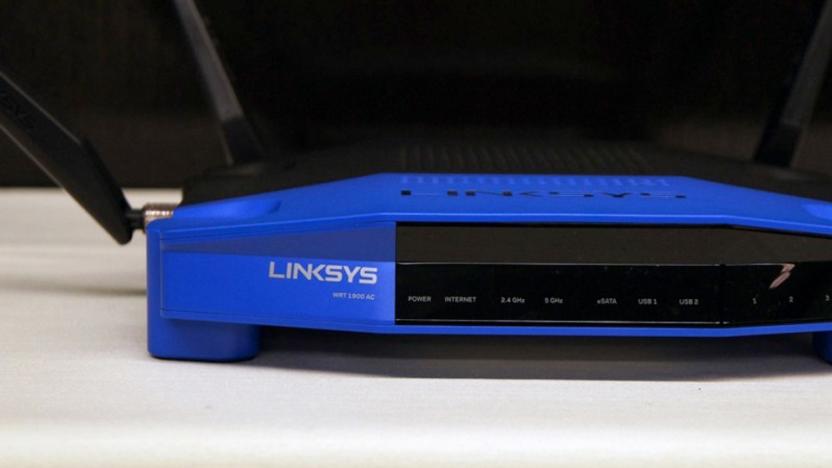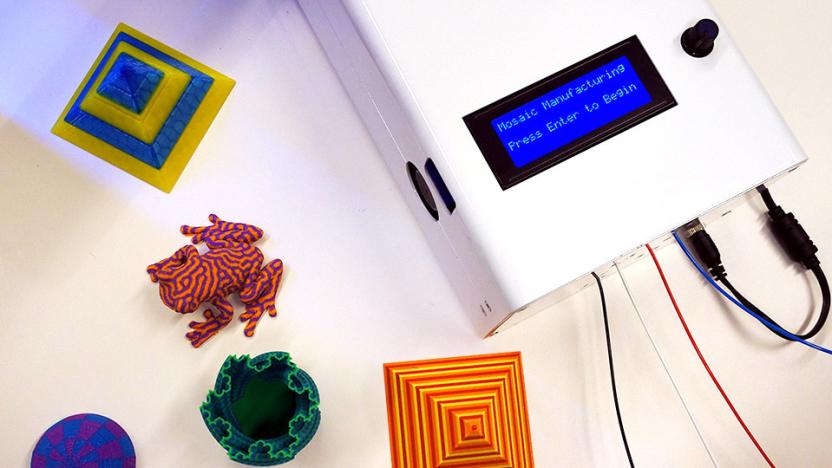opensource
Latest

Pre-order the first Ubuntu Linux tablet
If you've been talking a lot about using Ubuntu Linux away from your PC -- or using a mobile device as your PC -- you now get to put your money where your mouth is. BQ has started taking pre-orders for both the HD and full HD versions of the Aquarius M10, the first official Ubuntu tablet. Shell out a respective €259 ($289) or €299 ($335) and you'll get a 10-inch slate using Canonical's open source software, which can switch to a desktop PC mode when you attach an external display, keyboard and mouse.

Animation software used by Studio Ghibli will soon be free
You may not have heard of Toonz animation software, but you've no doubt seen work it was used in: Studio Ghibli films like Spirited Away and Tale of the Princess Kaguya (above), or the animated series Futurama. Now, the Toonz Ghibli Edition used by legendary Japanese filmmakers like Hayao Miyazaki is going open-source, making it free to use by studios and novice animators alike. The deal came after Japanese publisher Dwango acquired the software from Italian developer Digital Video. It's now focusing on customization and training, but will still sell a premium version to companies "at a very competitive price."

Wikipedia is developing a crowdsourced speech engine
Wikipedia announced on Thursday that it is collaborating with researchers from Sweden's KTH Royal Institute of Technology to develop an open, crowdsourced speech engine that will make the online encyclopedia more accessible to people with reading or visual impairments. Wikipedia estimates that 25 percent of its user base -- approximately 125 million people monthly -- will benefit from the new service. And while the engine will be optimized for use on Wikipedia itself, any site running MediaWiki software will be able to integrate it as well.

Google joins Facebook's effort to reinvent the data center
Facebook and Google aren't the best of friends, but they're willing to make exceptions for the right causes: Google has joined Facebook's Open Compute Project in a bid to improve data centers everywhere. It's starting off by contributing a new server rack spec that both improves power handling and lets project members' racks slip into Google computing farms. The move isn't entirely surprising, even though it involves an arch-rival. Google is no stranger to building its own hardware -- it's just offering some of that know-how to the tech industry in hopes of getting some upgrades in return.

UCLA open sources image detector that can see what we can't
UCLA has released the source code to powerful image detection software that can see an object's every detail at high speed -- key for applications like fingerprint and iris scanning, or self-driving cars. It starts by identifying an object's edges and then looking for and extracting its other, fainter features. For instance, if there are items with textured surfaces in the image, the algorithm can recognize and enhance them, as you can see in the example below the fold. It can even see through bright lights to detect their sources' structures, such as lamps, LED lights and even the moon.

AMD wants to open up PC graphics chips
AMD isn't just depending on ever-faster chipsets to boost graphics performance -- it thinks coders can lend a hand, too. The company's new GPUOpen effort gives developers the kind of open source code and documentation they need to use low-level PC video card features, port apps and otherwise understand GPU aspects that are normally kept hush-hush (outside of game consoles, at least). If everything goes smoothly, you'll see games that look nicer on current hardware, and general computing tasks that lean more on GPUs to crunch numbers.

North Korea's version of Linux is extremely oppressive
It's no secret that North Korea has its own Linux distribution, Red Star OS, that limits you to a government-approved view of the world. However, researchers have just taken an in-depth look into how Red Star works -- and it's clear that software is as authoritarian as the country that created it. Besides its known tendency to watermark files on USB sticks (to track people shuttling contraband material), Red Star is paranoid about modifications. It not only has extra safeguards around key system files, but will immediately reboot the PC if it detects changes to those files.

FCC: Yes, you're allowed to hack your WiFi router
A few months ago, the FCC proposed regulations that theoretically banned the use of open source firmware on your WiFi router. Needless to say, that rubbed a lot of enthusiasts the wrong way -- how were you supposed to improve features or security on your own terms, especially on routers that were designed to be hacked? Well, you needn't fear any longer. On top of reassurances from October, the FCC has modified its proposal to allow open source firmware like DD-WRT or Tomato. The agency will only forbid tweaks that take a router "out of compliance," such as an overly strong signal. In short, you can flash your WiFi hotspot in the future without worrying that the feds will come knocking.

Google just released new AI software that can learn faster
Google is ignoring everything the Terminator franchise taught us and is releasing "TensorFlow", open-source software that helps computers learn quicker than ever before. The software is a branch of artificial intelligence called "machine learning," tech that has already found a home in Google Search, Google Photos and Gmail. Tech-giants, like Google, Facebook and Amazon are all working with machine learning to better the services that they offer like smart search, ad targeting and product recommendations. Machine learning is now shifting into a complex realm where researchers are creating computer models that can see and even understand what it's looking at.

Pixar will open-source the code for a key movie-making tool
Fancy that you could create the next Inside Out if you only had the right tools? Pixar just made that dream a little more realistic. Mere months after giving away Renderman, the studio has announced plans to open the source code for its Universal Scene Description software, which gives multiple computer animation apps a common "scene graph" to work from. It should help movie makers streamline the production process (particularly if there's more than one company involved), but it'll also be a boon to animation app designers who want their various programs to play together.

Microsoft has iOS devs building the 'bridge' for Windows 10 apps
It's no secret -- even with its fast start, Microsoft needs more apps on Windows 10, across PCs, tablets and phones. Many of the most popular ones are already built for Android, iOS or even older versions of Windows, but supporting another platform can be tricky. To solve that problem, in April Microsoft announced "Windows Bridge" tools to make it easy for those developers to reuse already written code in new Windows apps. Now it's ready to live up to that promise, and is releasing an early look at the bridge for iOS today. More importantly, it's even opening up the source code (Github) for the Bridge tool itself so the people who will use it can help make it better. If you'd rather use apps than make them, then this doesn't necessarily mean you'll see ported over iPad or Android apps simply running on your PC, just that developers won't have to change so much of the stuff in the background to make them work.

White House speeds up (and opens up) online petitions
The White House's We the People site is supposed to help the government hear your calls for change, but that isn't quite how it worked out: backlogs meant that it took ages to respond to petitions. You'll be glad to hear that the service is getting a much-needed tune-up, though. As of today, the White House plans to respond to any petition that hits the 100,000-signature goal within 60 days "wherever possible." There's also a new team dedicated solely to making sure that the right people see a petition, which should help cut through some of the bureaucratic hierarchy.

Trippy exhibit uses Kinect to send kids to the wilderness
#fivemin-widget-blogsmith-image-351325{display:none;} .cke_show_borders #fivemin-widget-blogsmith-image-351325, #postcontentcontainer #fivemin-widget-blogsmith-image-351325{width:570px;display:block;} try{document.getElementById("fivemin-widget-blogsmith-image-351325").style.display="none";}catch(e){}"Whoaaa," said a child as he walked through the doors around noon. His eyes widened and he picked up his pace at the sight of Connected Worlds, a series of stunning landscapes projected on giant walls at the New York Hall of Science in Queens. The light from the 3,000-square-foot installation illuminated his face in hues of green and blue. At the center of the room, surrounded by screens, a couple dozen kids ran from one magical habitat to another, chasing fantastical creatures and digital streams in the interactive space.

Apple's Swift programming language is going open source
Last year, Apple introduced Swift, its very own programming language, which was focused on making it easier to build apps. Now, in a bid to make it more palatable to developers, Apple is making another big move: It's making Swift open source. That'll give developers full access to all of Swift's inner workings, and it might even tempt over people who were worried about adopting a proprietary Apple language. "We think Swift is the next big programming language, the one that we'll all be doing application and system programming on for 20 years to come," Apple's SVP of software engineering, Craig Federighi, said during WWDC today. "We think Swift should be everywhere and used by everyone." The language is also getting some upgrades this year with Swift 2, which includes support for new optimization technology, protocol extensions and much shorter compile times.

Leaked trade deal stops countries from saying where your data goes
There's been a fair share of leaked trade deals raising hackles in recent memory, but the latest could have some big repercussions for your data privacy. WikiLeaks has slipped out details of the in-progress Trade in Services Agreement (TISA), and one of its clauses would prevent the US, European Union and 23 other nations from controlling both where your data is stored as well as whether or not it's accessible from outside of the country. Germany, for example, couldn't demand that Facebook and Google store residents' account information on local servers.

A fight is brewing over ads in the 'open-source Photoshop'
Far from just being that character in Pulp Fiction, GIMP is also an open-source alternative to Photoshop that's given away freely for all to use. Unfortunately, there's been a kerfuffle between the project's creators and SourceForge, one of the places that the software is available to download. The latter stands accused of adding for-profit adware to its version of GIMP, which is a big no-no amongst the free and open-source software community. In a posting to Google+, SourceForce is alleged to have frozen out GIMP for Windows rep Jernej Simončič and subsequently injecting malicious code into the build to trap unwitting users.

Latest Ubuntu hits the web with mostly minor refinements
Today's release of Ubuntu 15.04 is yet another installment in the slow and steady march forward from Canonical. The company knows that not every OS release needs to be accompanied by fanfare and dramatic changes to your desktop. And this edition of the popular Linux distro perfectly epitomizes that philosophy. There are basically zero user-facing interface changes, except for the ability to set application menus to always show, instead of only popping up when you mouse over them. Otherwise most of the changes are under the hood. The OS should be faster and more stable, thanks to updates to updates to the underlying system, like the Unity desktop and Linux kernel. The default apps also got some minor version bumps, including Firefox and LibreOffice.

The Palette brings multiple colors to your 3D printer
3D printers are great for homemade toys. But most affordable desktop machines can only print monochrome models. Mosaic Manufacturing, a Montreal-based startup, has created The Palette, a filament feeding system that turns a single-extruder 3D printer into a multicolor printing machine. It acts like a bridge between your current printer and ever-evolving filament options. You can feed it up to four colors or play around with wood, steel or conductive varieties. It works in tandem with your machine, so it calculates and cuts the filaments needed for each element in a design before fusing them into one continuous string for your printer.

Google's 'Works with Cardboard' program is all about VR compatibility
Google wants all apps developed for its Cardboard VR headset to work properly with, well, any version of its device. That's tougher than it sounds, since the headset's open-source, and a lot of companies and individual users are tweaking it to their heart's content. To make it happen, Mountain View has launched the "Works with Google Cardboard" project, which gives headset makers the power to ensure their design plays nicely with apps made for the device. It doesn't matter if they use metal or plastic, cut the materials out using any dimension or adjust the optic, so long as they input all those details into the Cardboard website to get a QR code to attach to their creation.

Google open-sources its Santa Tracker a few months late
Google might want to improve its timing a bit. You see, the search giant has released the source code for its Santa Tracker apps... in April. In other words, right when the snow has finished melting in many corners of the world. That's a little too late (or alternately, too soon) to help create holiday apps, Google. As you might gather, though, the festive theme is beside the point. The open source content is really meant to show how the folks in Mountain View make a lively website that works on everything from phones to desktops, not to mention a host of Android games and smartwatch faces. Hopefully, you'll see at least a few apps and sites in the near future that have an extra amount of polish, whether or not Kris Kringle is involved.









